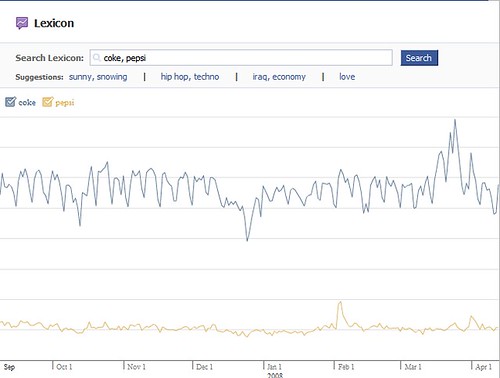Facebook Adds Lexicon And “Friend Feed” Style Outside Activity Alerts
Facebook hasn’t yet added web search but it is allowing users to import content from third-party sites. Users are now permitted to import stories and content (into their mini-feeds) from a handful of sites: Flickr, Yelp, Picasa, and del.icio.us to start with, Digg and others to come. The intention is to enable people to do […]
Facebook hasn’t yet added web search but it is allowing users to import content from third-party sites. Users are now permitted to import stories and content (into their mini-feeds) from a handful of sites: Flickr, Yelp, Picasa, and del.icio.us to start with, Digg and others to come. The intention is to enable people to do more on Facebook, without having to go “outside.”
In addition, Facebook has launched what it calls “Lexicon,” a successor to the shuttered Pulse. Lexicon is like the Yahoo Buzz Index or Google Trends/Zeitgeist in a way.
Yet it’s not as specific or useful. Here’s how it’s derived according to site FAQs:
Lexicon is a tool to follow language trends across Facebook. Specifically, Lexicon looks at the usage of words and phrases on profile, group and event Walls. For example, you can enter “love, hate” (without quotations) to compare the usage of these two words on Facebook Walls. You may enter up to five terms, where each term can be a word or two-word phrase consisting of letters and numbers.
Lexicon shows the number of users that posted each term per day on a profile, event or group Wall. It does not count repeated terms by the same user on the same day. This is to account for the seasonality of Wall posting in general; for example, there are fewer overall posts in the month of December. The text of each Wall post is also “cleaned” before it gets counted. For example, every word is converted to lower-case, and apostrophes are removed (so “You’ll” turns into “youll”).
Beyond novelty this might be valuable to marketers and others, like search queries, to determine what people on Facebook were interested in, thinking about doing, test “buzz,” or to determine opinions about subjects, brands, and companies. It currently has some but limited utility in each of those scenarios. Beyond generic subjects like “vacation” and “love” one can compare things like Coke vs. Pepsi or McCain vs. Obama:
I’m sure there will be more functionality added and it will become a more useful research tool in the near future.
Contributing authors are invited to create content for Search Engine Land and are chosen for their expertise and contribution to the search community. Our contributors work under the oversight of the editorial staff and contributions are checked for quality and relevance to our readers. The opinions they express are their own.
Related stories
New on Search Engine Land

